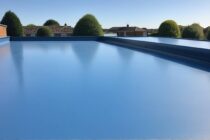Fiberglass Roof Systems
An Overview of Fiberglass Roof Systems
Fiberglass roof systems are a popular and cost-effective option when it comes to protecting buildings from weather and the elements. They offer greater durability and wearability compared to most other roof systems, making them an ideal choice for commercial, industrial, and residential applications. Learn more about the features, materials, installation process, and costs of fiberglass roof systems here.
Fiberglass roofs are a type of roofing material that is becoming increasingly popular due to their durability, versatility, and aesthetic appeal. These roofing systems are made of fiberglass, which is a type of reinforced plastic that is lightweight, strong, and flexible.
Fiberglass roof systems are commonly used in commercial and industrial buildings, but they can also be used in residential properties. These systems come in a variety of shapes and sizes and can be customized to fit specific design requirements. Some of the key features of fiberglass roof systems include:
- Durability: Fiberglass is a highly durable material that can withstand harsh weather conditions, such as heavy rain, snow, and strong winds. This makes fiberglass roof systems ideal for areas with extreme weather conditions.
- Lightweight: Fiberglass is a lightweight material, which makes it easier to transport and install. This also means that less structural support is required, which can reduce construction costs.
- Versatility: Fiberglass roof systems can be used on flat or sloping roofs, and they can be customized to fit almost any shape or size. They can also be coated with different materials to improve their resistance to UV rays and improve their aesthetic appearance.
- Energy efficiency: Fiberglass roof systems can be designed to improve the energy efficiency of buildings. For example, they can be coated with reflective materials to reduce heat absorption and lower cooling costs.
- Low maintenance: Fiberglass roof systems are relatively low maintenance and require minimal repairs over their lifetime.
Benefits of Fiberglass Roofing Systems.
Fiberglass roof systems offer an array of benefits including insulation, durability, and fire resistance. Fibreglass roofs are very lightweight and flexible, making them easy to install and repair if needed. They also last a long time; with proper maintenance, fiberglass roofs can last up to 50 years or more. Additionally, fiberglass roofs provide great soundproofing capabilities, helping reduce noise and improve the building’s interior acoustics. Finally, these systems are usually less expensive than other roof types such as metal and shingle roofing systems.
Fiberglass roofing systems offer several benefits compared to other roofing materials. Here are some of the key advantages of using fiberglass roofing systems:
- Durability: Fiberglass systems are highly durable and can withstand extreme weather conditions, including high winds, heavy rain, and hail. They are also resistant to UV rays, which means they won’t fade or deteriorate over time.
- Lightweight: Fiberglass roofing systems are lightweight, which makes them easy to install and reduces the load on the building’s structure. This can result in lower construction costs.
- Versatility: Fiberglass roofing systems can be designed to fit almost any shape or size of roof. They can also be coated with various materials to improve their resistance to UV rays and enhance their aesthetic appearance.
- Energy efficiency: Fiberglass roofing systems can be designed to reflect sunlight, which can help reduce the amount of heat absorbed by the building. This, in turn, can help lower cooling costs and improve energy efficiency.
- Low maintenance: Fiberglass roofing systems require minimal maintenance over their lifetime. They do not rot, rust, or corrode, and they are resistant to mold and mildew.
- Fire resistance: Fiberglass roofing systems are highly fire-resistant and have a Class A fire rating. This means they provide excellent protection against fire hazards.
- Cost-effective: Fiberglass roofing systems are cost-effective compared to other roofing materials, especially over the long term. They have a long lifespan and require minimal maintenance, which can help save on repair and replacement costs.



